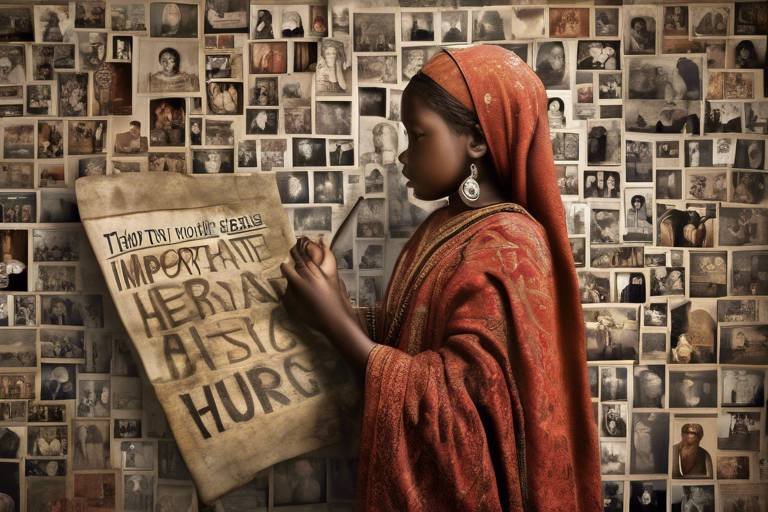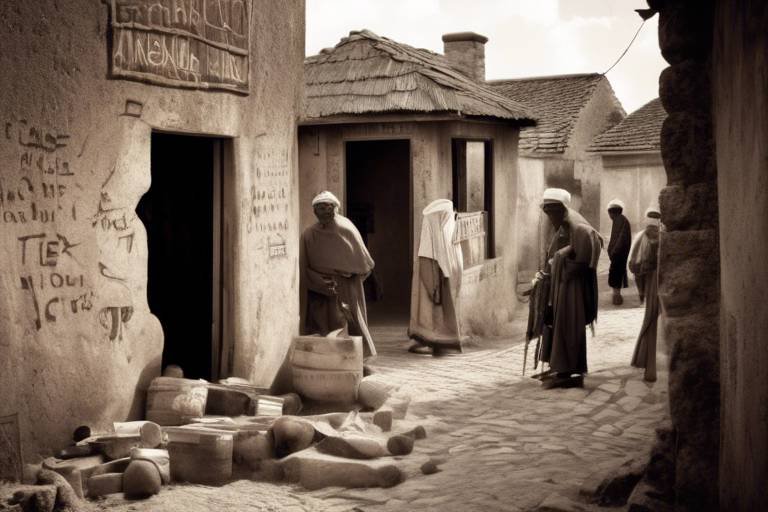How Cultural Heritage Shapes International Relations
Cultural heritage plays a pivotal role in shaping international relations, acting as a silent yet powerful force that influences diplomatic interactions and perceptions on the global stage. It serves as a bridge connecting nations through shared historical narratives, traditions, and values, while also highlighting the unique identities and pride of each country.
Historical narratives deeply embedded in cultural heritage can either foster understanding and cooperation between nations or exacerbate existing tensions and conflicts. By delving into the past, countries can find common ground or confront historical grievances that impact their present-day relations.
Soft power, a concept popularized by political scientist Joseph Nye, emphasizes the ability of countries to influence others through culture, values, and policies rather than coercion or force. Cultural diplomacy, a key component of soft power, allows nations to showcase their cultural heritage through art, music, cuisine, and traditions, fostering mutual understanding and goodwill.
Heritage preservation plays a crucial role in conflict resolution by preserving historical sites and artifacts that hold significance for different communities. By safeguarding cultural heritage, countries can promote reconciliation, peacebuilding, and mutual respect, laying the foundation for sustainable peace in conflict-affected regions.
Cultural heritage serves as a powerful identity marker for nations, shaping how they are perceived internationally and how they engage with other countries. It reflects the values, beliefs, and traditions that define a nation's character, influencing its foreign policies, alliances, and interactions on the global stage.
UNESCO, the United Nations Educational, Scientific and Cultural Organization, plays a vital role in protecting cultural heritage sites worldwide through its World Heritage List. By designating and preserving these sites, UNESCO promotes international cooperation, dialogue, and mutual respect among nations, fostering a sense of shared heritage and responsibility.
Cultural heritage tourism not only promotes economic growth but also strengthens diplomatic relations between nations. By attracting visitors from around the world to explore historical sites, museums, and cultural events, countries can forge economic partnerships, enhance people-to-people exchanges, and promote cross-cultural understanding.
However, the issue of cultural appropriation poses ethical challenges in international relations, as the commercial exploitation or misuse of cultural heritage can lead to misunderstandings, conflicts, and cultural insensitivity. It is essential for countries to respect and protect the cultural rights of indigenous communities and uphold the principles of cultural diversity and inclusivity.
Looking ahead, advancements in technology and globalization are expected to reshape the landscape of cultural heritage diplomacy and international relations. Virtual reality, digital archives, and online platforms will offer new opportunities for sharing and preserving cultural heritage, transcending physical boundaries and connecting people across continents.

The Influence of Historical Narratives
Exploring the impact of cultural heritage on diplomatic relations between countries and its role in shaping perceptions, policies, and interactions on the global stage.
Historical narratives deeply embedded in cultural heritage play a pivotal role in shaping international relations. These narratives can either serve as bridges that connect nations through shared histories or as barriers that exacerbate existing tensions. By examining the historical narratives present in cultural heritage, we can gain insights into how past events continue to influence present-day diplomatic interactions.

Soft Power and Cultural Diplomacy
Soft power and cultural diplomacy play crucial roles in shaping international relations by influencing perceptions, building relationships, and fostering cooperation between nations. Soft power, a concept coined by political scientist Joseph Nye, refers to the ability to attract and co-opt rather than coerce, using intangible assets such as culture, values, and policies to achieve foreign policy goals.
Cultural diplomacy, on the other hand, involves the exchange of ideas, art, language, and other aspects of culture to strengthen diplomatic relations and promote mutual understanding. It serves as a powerful tool for building bridges between countries and transcending political differences through shared cultural experiences.
By showcasing their cultural heritage on the global stage, countries can enhance their soft power and improve their international standing. Cultural events, exhibitions, and exchanges serve as platforms for promoting a positive image abroad and fostering goodwill among nations. Through cultural diplomacy initiatives, countries can establish connections beyond traditional diplomatic channels, creating long-lasting bonds based on mutual respect and appreciation.
Moreover, cultural diplomacy can help mitigate conflicts and build trust between nations by highlighting commonalities and celebrating diversity. By acknowledging and valuing each other's cultural heritage, countries can overcome stereotypes, prejudices, and misconceptions, paving the way for peaceful coexistence and cooperation.
Overall, soft power and cultural diplomacy offer unique opportunities for countries to engage with the world on a deeper level, transcending political differences and fostering meaningful relationships based on shared values and cultural understanding.

Heritage Preservation and Conflict Resolution
Heritage preservation plays a crucial role in conflict resolution by serving as a common ground for fostering understanding and reconciliation among conflicting parties. When cultural heritage sites are protected and respected, they can act as symbols of shared history and heritage, transcending political divides and promoting dialogue. These sites become tangible reminders of the need to preserve the past for future generations, instilling a sense of collective responsibility and mutual respect.
In conflict-affected regions, heritage preservation initiatives can contribute to rebuilding trust and promoting peacebuilding efforts. By safeguarding cultural landmarks and traditions, communities can find strength in their shared cultural identity, paving the way for healing and cooperation. The restoration of heritage sites damaged by conflict can also signify a commitment to moving forward and rebuilding a more harmonious future.
Moreover, heritage preservation can serve as a catalyst for sustainable development in post-conflict societies. By investing in the restoration and conservation of cultural heritage, countries can revitalize their cultural tourism sector, creating economic opportunities and promoting social cohesion. This dual focus on heritage preservation and conflict resolution not only preserves the past but also paves the way for a more prosperous and peaceful future.

Cultural Heritage as Identity Marker
Exploring the impact of cultural heritage on diplomatic relations between countries and its role in shaping perceptions, policies, and interactions on the global stage.
Examining how historical narratives embedded in cultural heritage can either bridge or exacerbate tensions between nations.
Discussing how countries leverage their cultural heritage to enhance their soft power and engage in cultural diplomacy initiatives.
Analyzing the role of heritage preservation in fostering reconciliation and peacebuilding efforts in conflict-affected regions.
Cultural heritage serves as a powerful symbol of national identity and pride, influencing international perceptions and relations. It is like a fingerprint that distinguishes one nation from another, showcasing unique traditions, values, and beliefs. Just as individuals wear their heritage as a badge of honor, countries proudly display their cultural heritage as a marker of their distinct identity on the global stage. This identity marker not only shapes how a nation is perceived by others but also influences how it perceives itself, fostering a sense of unity and belonging among its citizens.
Highlighting the role of UNESCO in safeguarding cultural heritage sites worldwide and its implications for international cooperation.
Examining the economic benefits of cultural heritage tourism and its impact on fostering economic ties and diplomatic relations between nations.
Addressing the ethical dilemmas surrounding cultural appropriation and its implications for international relations and cross-cultural understanding.
Predicting how advancements in technology and globalization will shape the future of cultural heritage diplomacy and international relations.
Stay tuned for the FAQ section coming soon!

UNESCO and Global Heritage Protection
Exploring the impact of cultural heritage on diplomatic relations between countries and its role in shaping perceptions, policies, and interactions on the global stage.
Examining how historical narratives embedded in cultural heritage can either bridge or exacerbate tensions between nations.
Discussing how countries leverage their cultural heritage to enhance their soft power and engage in cultural diplomacy initiatives.
Analyzing the role of heritage preservation in fostering reconciliation and peacebuilding efforts in conflict-affected regions.
Exploring how cultural heritage serves as a powerful symbol of national identity and pride, influencing international perceptions and relations.
Highlighting the role of UNESCO in safeguarding cultural heritage sites worldwide and its implications for international cooperation.
Examining the economic benefits of cultural heritage tourism and its impact on fostering economic ties and diplomatic relations between nations.
Addressing the ethical dilemmas surrounding cultural appropriation and its implications for international relations and cross-cultural understanding.
Predicting how advancements in technology and globalization will shape the future of cultural heritage diplomacy and international relations.
Stay tuned for the FAQ section coming soon!

Cultural Heritage Tourism and Economic Diplomacy
Cultural heritage tourism plays a pivotal role in fostering economic diplomacy between nations by leveraging the unique historical and cultural assets of a country to attract visitors and boost economic growth. When travelers explore ancient ruins, historical sites, museums, and cultural festivals, they not only contribute to the local economy but also engage in a form of cultural exchange that transcends borders. This interaction can lead to the establishment of strong economic ties and diplomatic relations between countries, as tourism acts as a bridge connecting people from different cultures and backgrounds. Moreover, cultural heritage tourism has the potential to showcase the rich diversity and heritage of a nation, creating opportunities for cultural diplomacy and mutual understanding. By promoting cultural exchanges through tourism, countries can enhance their soft power and influence on the global stage, shaping positive perceptions and fostering goodwill among international visitors. This form of diplomacy goes beyond traditional political channels, allowing nations to communicate their values and traditions directly to a global audience. In addition to the cultural and diplomatic benefits, cultural heritage tourism also significantly contributes to the economic development of a country. Tourist spending on accommodation, transportation, souvenirs, and local experiences injects revenue into the local economy, creating jobs and supporting small businesses. This economic boost not only benefits the tourism industry but also has a ripple effect on other sectors, driving overall economic growth and prosperity. Countries that effectively promote their cultural heritage as a tourism asset can strengthen their international standing and attract foreign investment. By strategically marketing their unique cultural offerings, nations can position themselves as attractive destinations for both leisure travelers and business investors. This alignment of cultural heritage tourism with economic diplomacy can lead to mutually beneficial partnerships and collaborations that drive sustainable development and prosperity on a global scale. In conclusion, cultural heritage tourism serves as a powerful tool for economic diplomacy, fostering cross-cultural exchanges, promoting mutual understanding, and driving economic growth. By harnessing the potential of cultural heritage to attract visitors and showcase national identity, countries can enhance their diplomatic relations, strengthen their soft power, and pave the way for a more interconnected and prosperous world.

Challenges of Cultural Appropriation
Cultural appropriation poses significant challenges in the realm of international relations and cross-cultural interactions. When one culture adopts elements from another without proper acknowledgment or respect, it can lead to misunderstandings, conflicts, and perpetuation of stereotypes. This issue raises ethical dilemmas that impact diplomatic relations and global perceptions.
One of the key challenges of cultural appropriation is the erosion of cultural integrity and authenticity. When aspects of a culture are taken out of context or commercialized for profit without considering their significance, it diminishes the value and meaning attached to those cultural elements. This can lead to cultural homogenization and loss of diversity, hindering genuine cultural exchange and mutual understanding.
Moreover, cultural appropriation can reinforce power dynamics and inequalities between cultures. When dominant cultures borrow elements from marginalized or oppressed communities without acknowledging their origins or giving credit, it perpetuates historical injustices and reinforces stereotypes. This can create tensions and resentment, affecting diplomatic relations and intercultural dialogue.
Addressing the challenges of cultural appropriation requires a nuanced approach that prioritizes respect, reciprocity, and understanding. It involves promoting cultural sensitivity, fostering dialogue between different cultures, and ensuring that cultural exchange is based on mutual consent and appreciation. By recognizing the complexities and implications of cultural appropriation, countries can work towards building more inclusive and respectful international relations.

Future Trends in Cultural Heritage Diplomacy
Exploring the impact of cultural heritage on diplomatic relations between countries and its role in shaping perceptions, policies, and interactions on the global stage.
Examining how historical narratives embedded in cultural heritage can either bridge or exacerbate tensions between nations.
Discussing how countries leverage their cultural heritage to enhance their soft power and engage in cultural diplomacy initiatives.
Analyzing the role of heritage preservation in fostering reconciliation and peacebuilding efforts in conflict-affected regions.
Exploring how cultural heritage serves as a powerful symbol of national identity and pride, influencing international perceptions and relations.
Highlighting the role of UNESCO in safeguarding cultural heritage sites worldwide and its implications for international cooperation.
Examining the economic benefits of cultural heritage tourism and its impact on fostering economic ties and diplomatic relations between nations.
Addressing the ethical dilemmas surrounding cultural appropriation and its implications for international relations and cross-cultural understanding.
Predicting how advancements in technology and globalization will shape the future of cultural heritage diplomacy and international relations.
Stay tuned for the FAQs section coming soon!
Frequently Asked Questions
- What is the significance of cultural heritage in international relations?
Cultural heritage plays a crucial role in shaping international relations by serving as a bridge between nations, influencing perceptions, policies, and interactions on the global stage. It acts as a powerful symbol of national identity and pride, impacting diplomatic relations and fostering cross-cultural understanding.
- How does historical narrative impact diplomatic relations?
Historical narratives embedded in cultural heritage can either bridge or exacerbate tensions between nations. Understanding and addressing these narratives are essential in promoting reconciliation, peacebuilding, and mutual respect in diplomatic interactions.
- What is the role of UNESCO in global heritage protection?
UNESCO plays a vital role in safeguarding cultural heritage sites worldwide, promoting international cooperation, and preserving cultural diversity. Its efforts contribute to peace, dialogue, and sustainable development by protecting shared heritage for future generations.
- How does cultural heritage tourism impact international relations?
Cultural heritage tourism not only promotes economic diplomacy by fostering economic ties between nations but also enhances mutual understanding and cultural exchange. It creates opportunities for dialogue, collaboration, and the promotion of peace through shared heritage experiences.
- What are the challenges associated with cultural appropriation in international relations?
Cultural appropriation poses ethical dilemmas in international relations by raising concerns about exploitation, misrepresentation, and the erosion of cultural identities. Addressing these challenges is essential for promoting respect, diversity, and harmonious cross-cultural interactions.
- How do advancements in technology and globalization influence cultural heritage diplomacy?
Advancements in technology and globalization are reshaping cultural heritage diplomacy by facilitating virtual exchanges, digital preservation, and global awareness of cultural heritage. These trends offer new opportunities for promoting cultural dialogue, understanding, and cooperation on a global scale.



















